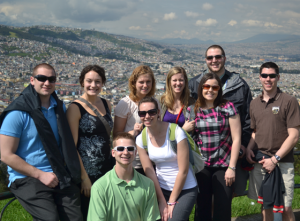Connecting Classroom Learning to the World
Teacher candidates travel to Ecuador as part of a Student Life Service Learning Experience
As students prepared for convocation, summer classes, and began their hunt for a summer job, eight University of Manitoba students instead packed their bags and boarded a plane to Ecuador as part of the Office of Student Life’s Ecuador Service Learning Experience. Of the eight students participating, three are Faculty of Education, Senior Years teacher candidates. They include 2011 graduating students Justin Charrier and Andrew Westwood, and returning student Justin Larkin. The students left April 27th and returned at the end of May 2011.
The students who participated in the Ecuador Service Learning Experience represented the faculties of Education, Environment, Kinesiology & Recreation Management, and Science.

Charrier, Westwood, and Larkin entered the Faculty of Education after completing a first degree in Physical Education. As a result, the students were prime candidates for the Ecuador program, which focused on building confidence through sport and language exchange in a Spanish language schools. Also, central to the program was a mentorship component that was developed with students at each of the four participating schools in the Municipal School District of Quito.
The overarching program themes of confidence, sport, and language guided the students and their experiences. Meghan Laube, Assistant Director, Student Life explained prior to leaving for Ecuador that, “Each student can expect to have a very individualized experience based on his/her expertise. The goals in this program are very individual. Some may be more focused on the professional development that this opportunity will afford, while for others, it is a very personal journey that allows them to contribute to a community that has identified a need for assistance. Each student will achieve something different personally, and the schools will benefit from the students personal growth. In addition, each school is unique. Each has specific goals that they hope this program will contribute to for the benefit of their students. We have respected these goals and the structure of the schools when we decided where to place the students.”
For the teacher candidates, their placement and education means that they will have worked with schools whose goals include: Increased physical activity for their students and teacher training in low resource game techniques. Westwood explains that, “Low resource activities are easy games that can be integrated into a classroom and get the students heart rate up while not consuming a lot of time or resources, and tend to be easy activities that you can do at the start or end of a class. They also maximize participation by not singling out kids, as the games are not dependant on a student’s skill level. Everyone can play and be successful.” At a Fall 2010 Special Area Group (SAG) meetings, Westwood, Charrier and other teacher candidates taught teachers about differentiation in low organized games. This experience, Westwood feels helped to prepare him for teaching the teachers in Ecuador.
To communicate instructions for the activities to young Spanish speaking students, the teacher candidates called on creative communication skills and welcome the opportunity to use the unique characteristics of physical education to connect and teach the students. Charrier explains that, “Physical education is a universal language. Through demonstration and visuals you can communicate a lot, so although language can be a barrier to many lessons, it is made a lot easier because of the visual and sensory aspects of Phys Ed activities. Also, the demonstrations coupled with English instruction will help to build the students English vocabulary – which is one of the reasons we went to Ecuador.”
Excited to have this opportunity, Larkin’s encourages students to get up, get out, and be active in the world. “The Service Learning Experience programs in Student Life expose students to new opportunities. And one of the best parts of this program is that we will be experiencing this as a group, making it possible to learn from each other and support each other. This is a really an amazing chance to connect with others and grow. Don’t let ‘stuff’ stop you – this is an experience of a lifetime!”
To prepare for Ecuador, the teacher candidates opened themselves to be flexible to change in order to get the most out of the experience and to help the schools get the most out of the relationship. Laube explains that The Ecuador Service Learning Experience is a pilot program and students are expected to participate in its building and its success. “It is important for students to connect their knowledge learned in the classroom, to the world around them. This program happens to be in an international setting, but addresses a need identified by our community partner. The reciprocal relationship that we have developed through collaborations on this project has helped to build a program that students will not only be able to contribute a lot to, but will take away many lessons that will assist them in whatever their future careers may be. We are helping students build themselves as leaders in our global community.”
The Ecuador Service Learning Experience is a unique opportunity for students to connect what has been learned in the classroom to the world around them. It also provides undergraduate students an opportunity to be part of a program whose programming is sensitive to the needs of those it is serving including the needs of U of M students who are participating in the service.
For more information on Service Learning Experience programs, please contact:
Meghan Laube,Housing and Student Life
204-474-6637
meghan_laube@umanitoba.ca
The Service Learning Experience programs are open to all University of Manitoba undergraduate students. Application begins in October on an annual basis.
The mentor of the Ecuador Service Learning experience is Blair MacLeod. MacLeod is a recently retired teacher with over 30 years of experience has been work with us here at the U of M. He has worked with various methods of self-directed learning and peer teaching during his teaching career.






